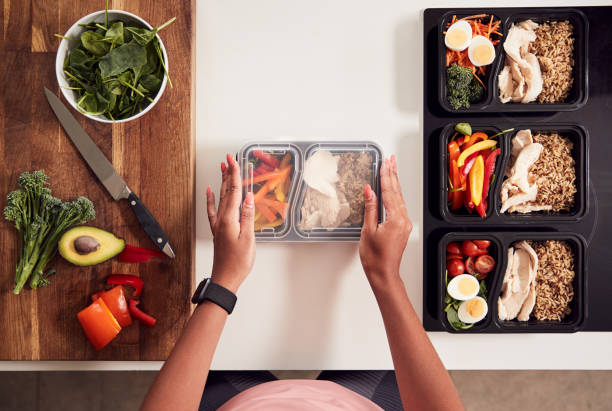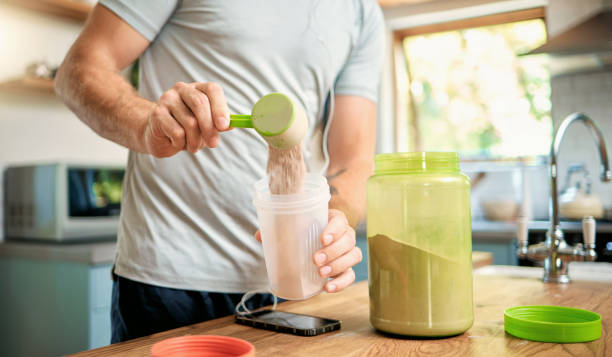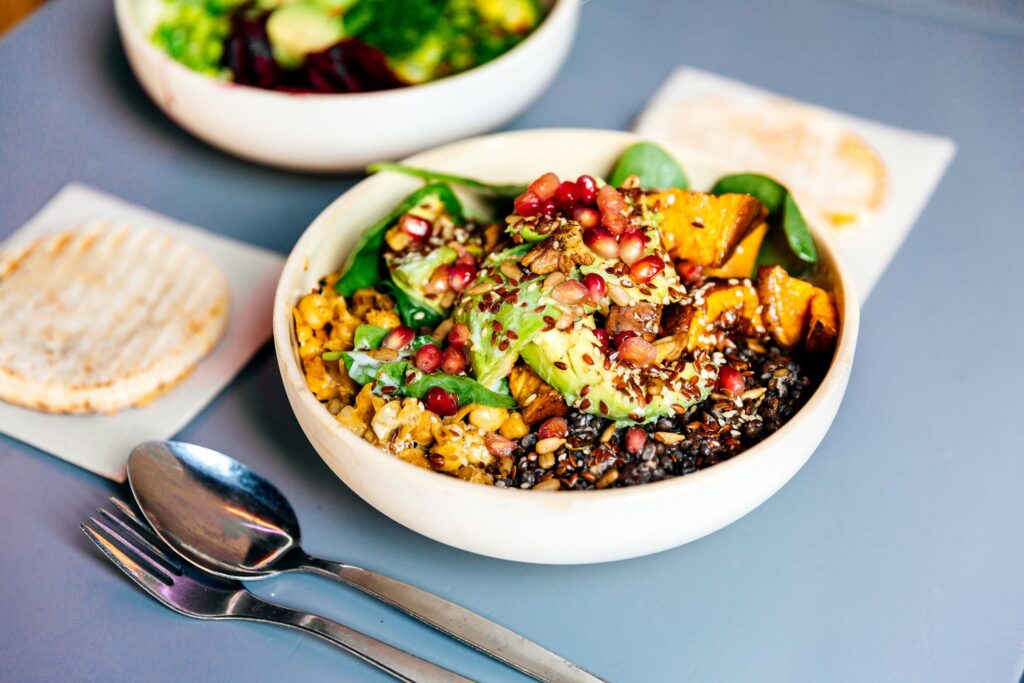In this blog post, we will dive into the science behind post-workout meals, understanding macros and their role in muscle recovery. We will also discuss timing your post-workout meal, foods to eat and avoid after a workout, and even provide you with some meal plan ideas and snack options to try out.
You’ve just finished a grueling workout and your muscles are begging for some fuel. This is where the importance of post-workout meals comes into play. A proper post-workout meal can help maximize muscle recovery, increase strength, and reduce soreness. But, what should you eat? Don’t worry, we’ve got you covered.
So let’s get started on maximizing your gains!
Why is a post-workout meal important?
Maintaining an active lifestyle is important for overall health and fitness, but it’s not just about the exercise itself. What you do after your workout is just as crucial to achieving your fitness goals. The post-workout meal is a critical component of any workout routine because it helps to replenish the nutrients that were lost during exercise. Eating the right foods after a workout can help to maximize muscle recovery and reduce soreness, ultimately leading to better performance in future workouts.
Research has shown that consuming protein, carbohydrates, and healthy fats within 30 minutes of finishing exercise can help increase muscle protein synthesis, leading to greater gains in lean muscle mass. Skipping a post-workout meal can lead to slower recovery times and decreased performance in future workouts, which is why it’s essential to prioritize post-workout nutrition as part of your overall fitness plan.
Understanding Macros in a Post-Workout Meal
When it comes to maximizing muscle recovery, understanding the macronutrient composition of your post-workout meal is crucial. Protein, carbohydrates, and healthy fats are all essential for optimal recovery and growth. Consuming protein after a workout helps repair and rebuild muscle tissue, while carbohydrates replenish glycogen stores that provide energy during exercise. Fats, although not as crucial as protein and carbs, can help slow down digestion and keep you feeling full for longer. Timing your post-workout meal within 30 minutes to an hour after exercise is also important to maximize nutrient uptake and muscle recovery.
What are macros?
In the world of nutrition, macros refer to macronutrients – the three main nutrients in our food: carbohydrates, protein, and fat. Each macronutrient plays a specific role in muscle recovery after a workout. Carbohydrates help replenish glycogen stores in muscles while protein is needed to repair and rebuild muscle tissue. Fat also plays a role in post-workout recovery by aiding in the absorption of certain vitamins and minerals. Balancing macros in your post-workout meal can help maximize muscle recovery and improve overall performance. Understanding macros is essential to designing an effective post-workout meal plan that aligns with your fitness goals.

Importance of protein in a post-workout meal
Consuming protein after a workout is crucial for muscle recovery and growth. When you exercise, your muscles undergo stress and damage, and protein helps repair and rebuild the tissue. Aim to consume 20-30 grams of high-quality protein in your post-workout meal to maximize muscle recovery. Good sources of protein include lean meats, poultry, fish, eggs, dairy, and plant-based options such as beans, lentils, and tofu. Additionally, incorporating carbohydrates into your post-workout meal is essential for replenishing glycogen stores and providing energy for the body. A balanced combination of both protein and carbs can help improve muscle recovery time and overall performance.
Role of carbohydrates in a post-workout meal
Consuming carbohydrates after a workout is crucial for restoring glycogen levels in the muscles, providing energy for the body, and preventing muscle breakdown. However, not all carbohydrates are created equal. Complex carbohydrates found in foods such as whole grains, fruits, and vegetables should be prioritized over simple sugars.
They provide sustained energy and are rich in fiber and essential vitamins and minerals. When combined with protein and healthy fats in your post-workout meal, they can enhance muscle recovery and improve overall performance. So next time you hit the gym, make sure to incorporate complex carbohydrates into your post-workout meal for optimal results.
Role of good fats in a post-workout meal
Including good fats in your post-workout meal can help reduce inflammation and aid in muscle recovery after a workout. Good fats, such as those found in nuts, avocado, and olive oil, are essential for the body to absorb vitamins and minerals from food. They also play a crucial role in regulating hormone production and supporting the immune system. It’s important to balance your intake of good fats with protein and carbohydrates to optimise muscle recovery and overall health. Some good sources of healthy fats include salmon, chia seeds, almonds, and coconut oil. Consulting with a nutritionist or dietitian can help you determine the right balance of macros for your individual needs.

Timing Your Post-Workout Meal
After a strenuous workout, it’s essential to refuel your body with the right nutrients to maximize muscle recovery. Timing plays a critical role in this process, and the first 30 minutes post-workout is the most important period for muscle repair. Consuming a meal or snack that contains both protein and carbohydrates during this window helps repair and rebuild muscle tissue while replenishing energy stores. Don’t forget about hydration; drinking plenty of water or electrolyte-rich beverages post-workout aids in rehydration and supports muscle recovery.
How soon should you eat after a workout?
Proper timing of your post-workout meal is crucial to maximize muscle recovery and replenish energy stores. Ideally, you should aim to consume a meal or snack containing protein and carbohydrates within 30 minutes to an hour after your workout. This is because during this timeframe, your muscles are most receptive to nutrient uptake, allowing for optimal repair and rebuilding.
Studies have also shown that consuming protein-rich foods after exercise can help increase muscle protein synthesis, leading to improved strength and muscle growth over time. However, the amount and composition of the post-workout meal will ultimately depend on the intensity and duration of your workout, so it’s essential to listen to your body’s needs and fuel it with nutritious foods accordingly.
Best time to eat after a workout for muscle recovery
Optimizing your post-workout meal is crucial for muscle recovery, and timing is key. Eating within 30 minutes to an hour after your workout is recommended. This period is the most critical time for muscle recovery, as your body is actively seeking out nutrients to replenish energy stores and repair muscle tissue.
Consuming a meal or snack containing a combination of protein and carbohydrates can help achieve this. Research suggests that a 3:1 ratio of carbohydrates to protein is optimal for muscle recovery, but the amount you consume will depend on the intensity and duration of your workout. Remember to stay hydrated with water or electrolyte-rich beverages post-workout to aid in recovery.
Foods to Eat in a Post-Workout Meal
After a workout, it’s important to refuel your body with the right nutrients to help with muscle recovery and growth. Here are some foods to consider incorporating into your post-workout meal:
- Protein: Your muscles need protein to rebuild and repair after exercise. Good sources of protein include lean meats, poultry, fish, tofu, beans, and lentils.
- Carbohydrates: Carbohydrates are important for replenishing your glycogen stores, which provide energy for your next workout. Good sources of carbohydrates include whole grains, fruits, and vegetables.
- Healthy Fats: Healthy fats are important for overall health and can help with inflammation in the body. Good sources of healthy fats include avocados, nuts, seeds, and olive oil.
- Water: It’s important to stay hydrated after a workout to replace any fluids lost through sweat. Aim to drink water before, during, and after your workout.
Some specific examples of post-workout meals include:
- Grilled chicken breast with roasted sweet potatoes and steamed broccoli.
- Scrambled eggs with spinach and whole grain toast.
- Tuna salad with mixed greens and quinoa.
- Greek yogurt with berries and almonds.
- Black bean and vegetable stir-fry with brown rice.
Remember, the exact composition of your post-workout meal will depend on your individual needs and goals. Consult with a registered dietitian or healthcare provider for personalized recommendations.

Best sources of protein for muscle recovery
Protein is essential for muscle recovery, as it provides the building blocks necessary for muscle repair and growth. Here are some of the best sources of protein for muscle recovery:
- Lean meats: Lean meats such as chicken, turkey, and beef are excellent sources of protein for muscle recovery. They are also low in fat, making them a great choice for those looking to build muscle while minimizing excess body fat.
- Fish: Fish, such as salmon, tuna, and sardines, are rich in protein and also contain omega-3 fatty acids, which have anti-inflammatory properties that can help reduce muscle soreness and promote muscle recovery.
- Eggs: Eggs are an excellent source of high-quality protein and are also rich in amino acids that are essential for muscle recovery.
- Dairy products: Dairy products such as milk, cheese, and yogurt are rich in protein and also contain calcium, which is important for bone health.
- Plant-based proteins: Plant-based sources of protein, such as beans, lentils, quinoa, and tofu, are also excellent choices for muscle recovery. These sources of protein are often lower in fat and can also provide other important nutrients, such as fiber, vitamins, and minerals.
It’s also important to note that the timing and amount of protein consumption can affect muscle recovery. Consuming protein within 30 minutes to an hour after exercise can help maximize muscle recovery. Additionally, it’s recommended to consume 0.14 to 0.23 grams of protein per pound of body weight within this timeframe.
Best sources of good fats for muscle recovery
Good sources of fats that can aid in muscle recovery include:
- Avocado: This fruit is an excellent source of healthy fats, containing mainly monounsaturated fats which can help reduce inflammation in the body.
- Nuts: Almonds, walnuts, cashews, and pistachios are all great sources of healthy fats. They also contain protein and other essential nutrients that can aid in muscle recovery.
- Fatty fish: Salmon, sardines, mackerel, and tuna are all rich in omega-3 fatty acids which have been shown to have anti-inflammatory properties and can aid in muscle recovery.
- Olive oil: This oil is a rich source of monounsaturated fats and has been shown to have anti-inflammatory properties which can aid in muscle recovery.
- Chia seeds: These tiny seeds are a great source of omega-3 fatty acids and fiber, which can help with digestion and muscle recovery.
- Flaxseeds: Similar to chia seeds, flaxseeds are also a great source of omega-3 fatty acids and fiber.
- Coconut oil: This oil is a rich source of medium-chain triglycerides (MCTs) which can provide quick energy for the body and aid in muscle recovery.
It’s important to note that while these fats can aid in muscle recovery, they should still be consumed in moderation as part of a well-balanced diet.
Sample post-workout meal plan
A post-workout meal is essential to help your body recover and refuel after exercise. Here’s a sample post-workout meal plan:
Option 1:
- Grilled chicken breast or salmon fillet
- Roasted sweet potatoes or quinoa
- Steamed broccoli or green beans
Option 2:
- Smoothie bowl made with Greek yogurt, mixed berries, spinach, and almond milk
- Topped with sliced banana, chia seeds, and granola
Option 3:
- Whole-grain turkey wrap with avocado, spinach, and tomatoes
- Sliced apple with almond butter
Option 4:
- Grilled tofu or tempeh
- Brown rice or whole-wheat pasta
- Steamed or roasted mixed vegetables (such as carrots, bell peppers, and zucchini)
Remember to drink plenty of water to rehydrate after your workout. It’s also important to adjust the portion sizes and macronutrient ratios based on your individual needs and fitness goals.
Foods to Avoid After a Post-Workout Meal
Actually, there aren’t any specific foods that you need to avoid after a post-workout meal. In fact, it’s important to consume a balanced meal after a workout that includes carbohydrates, protein, and healthy fats to help replenish energy stores and aid in muscle recovery. However, there are some foods that may not be the best choices to consume after a workout because they can cause digestive discomfort or slow down nutrient absorption.
Here are some foods to be cautious about consuming after a post-workout meal:
- High-Fiber Foods: Foods high in fiber can slow down digestion and delay nutrient absorption, which may interfere with the recovery process. It’s best to avoid foods like beans, legumes, and certain fruits and vegetables immediately after a workout.
- High-Fat Foods: Foods high in fat can also slow down digestion and delay nutrient absorption, so it’s best to limit foods like fried foods, fast food, and processed snacks.
- Sugary Foods: While it’s important to consume carbohydrates after a workout, it’s best to avoid foods that are high in added sugars. Instead, opt for whole food sources of carbohydrates like sweet potatoes, brown rice, or fruits.
- Alcohol: Consuming alcohol after a workout can dehydrate your body and interfere with muscle recovery, so it’s best to avoid alcohol for a few hours after your workout.
In general, it’s important to focus on consuming nutrient-dense foods after a workout to help your body recover and build muscle. Remember to drink plenty of water to stay hydrated as well!
Let’s Sum Up
A post-workout meal is crucial for maximizing muscle recovery and growth. It should consist of a balance of macronutrients, including protein, carbohydrates, and good fats. Timing is also critical, as the body’s ability to absorb nutrients is highest immediately after exercise. Some of the best sources of protein include chicken, fish, and eggs, while complex carbohydrates can be found in quinoa, brown rice, and sweet potatoes. Avoid processed and high-fat foods that can hinder muscle recovery.



